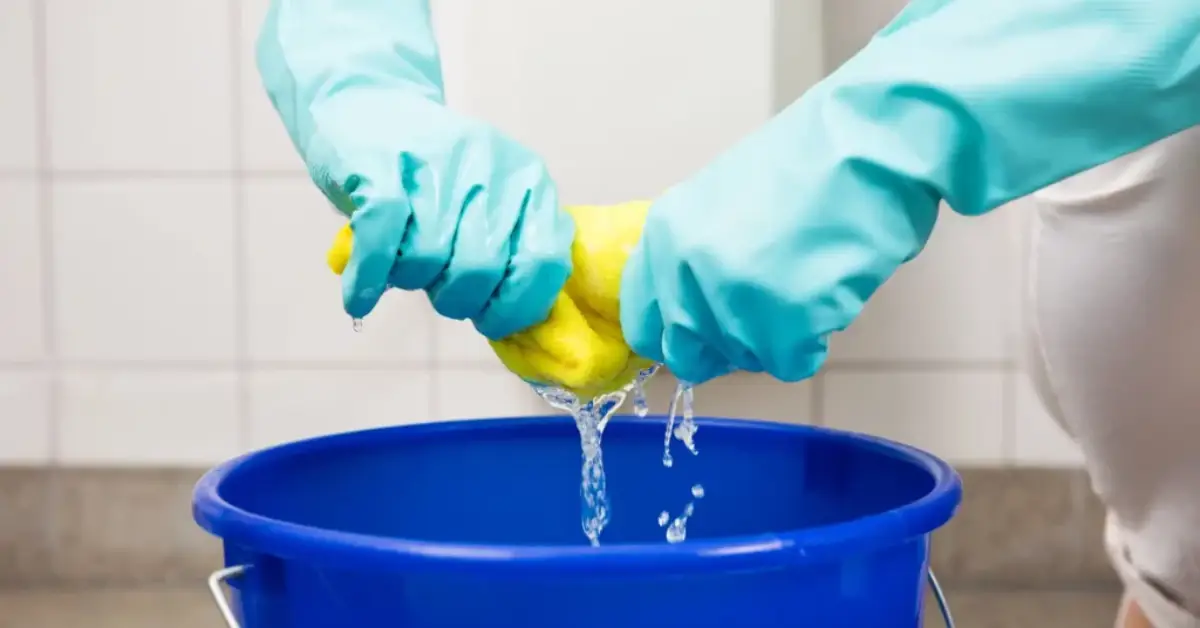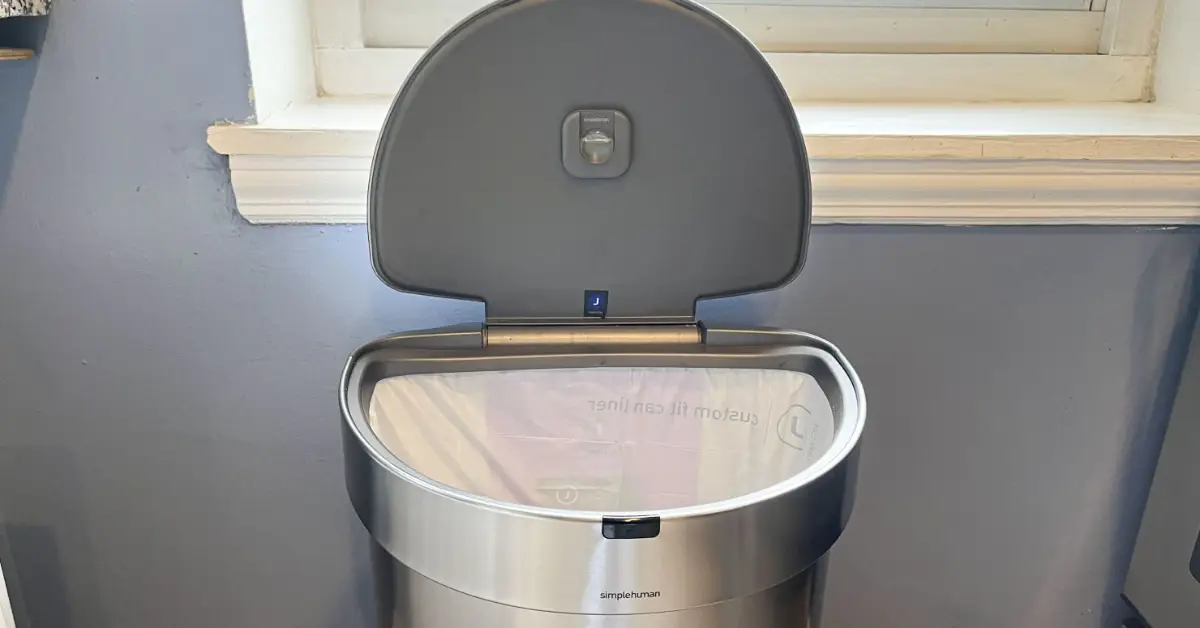5 Smart Bin Cleaning Tips That Will Totally Change How Your Kitchen Smells
I’ve lost count of how many times I’ve opened my kitchen bin, only to be hit by that warm, sour smell that makes you question every life choice leading up to that moment. It doesn’t matter how often you empty it — a few days later, the odour always finds its way back. And if your bin sits near the stove or dishwasher, the heat only makes it worse.
When I started looking into why bins smell even when they’re clean, I realised it’s not just the food waste — it’s the moisture, the plastic, and sometimes even the liner itself. Most people scrub the inside, spray some disinfectant, and think they’re done. But within 48 hours, the smell creeps back because the bacteria never really left.
Over the years, I’ve tested every hack you can imagine — citrus peels, charcoal, coffee grounds, even freezing food scraps before bin day. Some worked beautifully; others made things worse. That’s why I wanted to share the five tricks that actually stop bin smells for good. They’re simple, science-backed, and take less than five minutes a week.
What’s the worst bin smell you’ve ever had to deal with — and how did you try to fix it?
The Real Reason Your Bin Keeps Smelling (and It’s Not Just Food Waste)
Let’s be honest — you’ve probably cleaned your bin more times than you care to admit, only for that same foul smell to creep back a few days later. I’ve been there too. The truth is, food waste isn’t always the real villain — it’s the science behind what happens inside the bin after you close the lid.
Every scrap of food starts to decompose the moment it’s thrown away. When that happens in a closed, slightly warm space, bacteria multiply fast, producing gases like methane and ammonia. Add a bit of leftover moisture from rinsed containers or vegetable peels, and you’ve got the perfect recipe for a smell that won’t quit.
But here’s what most people don’t realise — your bin itself can be part of the problem. Over time, the plastic absorbs odours, especially if it’s scratched inside. Bin liners trap moisture between the liner and the bin wall, creating a hidden breeding ground for bacteria. Even the lid design can make things worse if air circulation is poor.
According to the Good Housekeeping UK, Certain items are bound to smell more than others, especially when there’s fish or meat involved! That’s why it’s a good idea to rinse away any smelly liquids first before you tip it into the bin.
If your bin still smells despite your best efforts, the issue isn’t your cleaning — it’s the invisible stuff your cleaner can’t reach.
Mistakes Everyone Makes When Cleaning Their Bin

I used to think scrubbing the inside of the bin with hot water and dish soap was enough. Turns out, it wasn’t even close. Most of us make small cleaning mistakes that keep feeding those bad smells, even when the bin looks spotless. Here are the most common ones I’ve seen (and made myself):
- Using only hot water instead of disinfectant – Hot water kills surface dirt but not odour-causing bacteria. A disinfectant or vinegar solution makes a huge difference.
- Forgetting the lid hinges and base corners – Those tiny areas collect grime and trapped food liquids that go unnoticed.
- Not drying completely before replacing the liner – Even a few drops of leftover water at the bottom can restart the bacterial cycle.
- Overusing scented sprays or air fresheners – They mask the smell temporarily but trap bacteria underneath, making the odour stronger later.
When you fix these four small habits, your bin stops being a petri dish and finally starts staying fresh between cleans. While you’re in cleaning mode, don’t forget those tricky corners — these genius ways to clean hard-to-reach light fixtures can make the rest of your space look and feel as fresh as your bin.
5 Proven Tricks to Stop Bin Smells for Good
I’ve tried everything from store-bought deodorisers to “miracle” sprays, but only a few simple tricks have consistently kept my kitchen bin fresh. The secret isn’t masking the smell — it’s stopping it from forming in the first place. Here are five methods that actually work, no gimmicks required.
Trick 1 — The Baking Soda Barrier
If you’ve ever put an open box of baking soda in your fridge, you already know how well it traps odours. The same principle works beautifully for your bin. Baking soda absorbs acidic gases and excess moisture — the two main reasons smells linger even after cleaning.
Here’s how to use it:
- Sprinkle two tablespoons of baking soda at the bottom of your bin before adding a new liner.
- Add another light sprinkle on top of the waste if it’s food-heavy (like peels or meat scraps).
- Empty and rinse your bin weekly to refresh the layer.
Even the Horsham Rural City Council in Victoria, recommends this simple trick as part of its top odour-reduction tips.
Trick 2 — Citrus Power Packs (Peels + Vinegar Mix)
If you prefer a natural, fresh scent instead of chemical sprays, this one’s a winner. Citrus oils — especially from lemon and orange peels — contain natural antibacterial properties that neutralise odours instead of covering them up.
You can make your own citrus vinegar wipe in minutes:
- Fill a jar with citrus peels.
- Pour white vinegar over them until covered.
- Let it sit for one to two weeks, then strain and pour into a spray bottle.
Use it to wipe the inside of your bin every few days. It smells great and kills bacteria at the same time. If you love a home that smells fresh beyond just the bin, try making your own DIY natural air fresheners using simple ingredients like citrus, herbs, and essential oils.
Trick 3 — Charcoal or Coffee Grounds at the Base
Here’s something few people talk about — your bin doesn’t just need cleaning, it needs filtering. Activated charcoal and used coffee grounds both work as natural filters, absorbing methane-based smells before they escape.
Quick comparison:
| Material | Cost | Effectiveness | Best Use |
|---|---|---|---|
| Activated Charcoal | Moderate | Excellent | For long-term control |
| Coffee Grounds | Free (reuse) | Good | For food bins, weekly use |
| Baking Soda | Cheap | Great | For moisture-heavy waste |
I usually place a small bowl of charcoal granules or a paper bag of used coffee grounds at the bottom of my bin — it’s surprisingly effective and eco-friendly.
Trick 4 — Freeze the Food Waste First

This might sound extreme, but it’s one of the smartest ways to stop kitchen bin smells — especially in the summer. If you have space in your freezer, keep a small reusable container or zip bag for food scraps like meat, fish, or dairy.
Freezing slows down decomposition completely. On collection day, you can toss the frozen waste into your outdoor bin.
Trick 5 — Line Smart, Not Heavy
Most people think using thicker liners helps, but that actually traps more moisture and bacteria inside. Instead, go for breathable compostable liners — they allow airflow, which keeps the inside dry and less smelly.
One trick that genuinely changed my bin routine: add a layer of newspaper at the bottom before the liner. It absorbs leaks and prevents food juices from pooling — advice inspired by Monash City Council’s food waste guide in Australia.
These small habits add up. Within a week, you’ll notice your kitchen smelling cleaner and fresher — not because you’re hiding the odour, but because you’ve stopped it where it starts.
What’s your go-to trick for keeping your bin fresh — and does it actually work for you?
Natural vs. Chemical Bin Deodorisers — Which Actually Works?
I’ve tested both — the homemade “natural fixes” and the branded cleaners promising instant freshness. The difference isn’t just about the smell; it’s about how long the freshness actually lasts and how safe it is for your home.
Here’s a quick comparison that’ll save you from trial and error:
| Type | Examples | Cost | Effectiveness | Safety | Best For |
|---|---|---|---|---|---|
| Natural | Baking soda, vinegar, activated charcoal | Low | High (when used regularly) | Non-toxic, safe for kids & pets | Everyday kitchen bins |
| Chemical | Enzymatic sprays, citrus-scented cleaners, bleach-based deodorisers | Moderate–High | Strong initially, moderate over time | May cause irritation or leave residue | Deep cleaning or emergency use |
Natural solutions like baking soda or charcoal work slowly but steadily — they absorb odours instead of masking them. They’re safe, cheap, and don’t leave behind artificial scents. You just have to refresh them weekly.
Chemical sprays, on the other hand, can kill bacteria quickly but often trap moisture underneath the scent, which causes smells to return faster. They’re fine for emergencies but not great for everyday use.
Even the U.S. Environmental Protection Agency (EPA) recommends Composting is nature’s way of recycling. It is one of the most powerful actions we can take to reduce our trash and build healthy soil. By turning our food scraps and yard trim into compost, we transform our waste streams into a beneficial, value-added soil amendment and use it to protect the environment and create resilient communities.
So, if you want freshness without fumes — stick to natural. They’re better for your bin, your nose, and the planet.
Outdoor Bins Need Different Care — Here’s Why
Outdoor bins are a different beast altogether. The mix of heat, humidity, and trapped waste creates an ideal setup for odour-causing bacteria. I’ve seen bins smell fine in winter and unbearable by midsummer — and it all comes down to how you clean them.
Here’s what actually works:
- Rinse the bin thoroughly with a garden hose once a week.
- Scrub using a vinegar or mild detergent solution.
- Dry it in the open air with the lid off — moisture is the enemy.
- Keep it in shade to slow down bacterial growth.
- Add a newspaper layer or a sprinkle of baking soda at the bottom before each use.
City waste departments often report more bin hygiene complaints in summer, especially from homes that don’t air-dry their bins. Once you start doing it, you’ll notice fewer flies, no maggots, and a big drop in that sour smell.
Think of your outdoor bin like a barbecue grill — it’s easier to keep clean if you don’t let grime build up between uses.
Bonus: 3 Odour-Fighting Products Worth Trying

I love a good DIY fix, but some days, you just need something quick and ready to go. After testing a bunch of products (and reading way too many Amazon reviews), here are three that genuinely make a difference — no overpromises, just results.
- Biodegradable Citrus-Scented Bin Liners: These liners do more than hold waste — they actively neutralise odours with a light citrus scent. The biodegradable material prevents trapped moisture and breaks down naturally, so you’re not adding plastic to landfill. Look for brands with 4.5+ Amazon ratings for reliability and leak resistance.
- Activated Charcoal Deodoriser Pods: These are a game-changer for enclosed bins. The charcoal absorbs odour molecules instead of masking them, and each pod lasts up to a month. I keep one at the bottom of my kitchen bin and another inside the lid — both make a noticeable difference within hours.
- Enzyme-Based Disinfectant Sprays: Unlike chemical sprays that only mask smells, enzyme cleaners break down the organic matter causing odour. They’re safe for plastic and metal bins and perfect for a deep clean before adding new liners. Look for options tested by trusted consumer platforms or reviewed on Which? for verified performance.
You don’t need all three at once — start with one that fits your routine and budget. The best bin system is the one you’ll actually stick to.
Long-Term Freshness Routine — Weekly & Monthly Checklist
Once your bin finally smells fresh, the goal is to keep it that way. It only takes a few minutes a week to stay ahead of the problem — and it saves you hours of deep cleaning later.
Weekly Routine
- Empty your bin on schedule (don’t wait for overflow).
- Sprinkle baking soda at the bottom after each clean.
- Wipe the lid, rim, and handles with a vinegar spray.
- Let the bin air-dry for at least 10 minutes before closing.
Monthly Routine
- Give your bin a deep wash with warm water and mild detergent.
- Dry completely in sunlight or open air.
- Replace your liner, and if possible, rotate between two bins so one stays dry.
Keeping odours away is only part of it — pair your routine with these everyday dust-free home habits to make your kitchen feel consistently fresh and low-maintenance.
The Eco-Friendly Angle — Keep It Clean Without Waste
A clean bin shouldn’t come at the cost of the environment. The best part is that most of the tricks we’ve discussed are already eco-friendly — you just have to make them a habit.
Here’s how to keep your cleaning routine green:
- Reuse citrus peels and coffee grounds instead of throwing them away — they’re natural odour absorbers.
- Skip harsh chemical sprays; they often end up in the water system. A simple vinegar and lemon mix works just as well.
- Compost regularly — separating food scraps keeps your bin cleaner and reduces methane build-up.
- Check your local council’s sustainability guide, like the one from Monash VIC, for eco-disposal and composting tips.
Keeping your home clean and sustainable is easier when you start small — and your bin is a great place to begin.
What about you?
Have you tried any of these tricks or products to stop bin smells? Share what worked (or didn’t) for you in the comments — your experience might help someone else find their perfect fix.
For more simple, practical home improvement guides, visit Build Like New — where every small upgrade makes your home feel brand new again.
Disclaimer: The cleaning methods and product suggestions in this article are based on general household experience and publicly available advice. Always test any cleaning solution or product on a small area first, and follow manufacturer or local waste guidelines for safe use and disposal.


